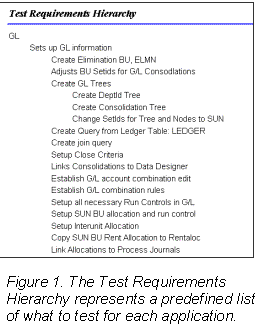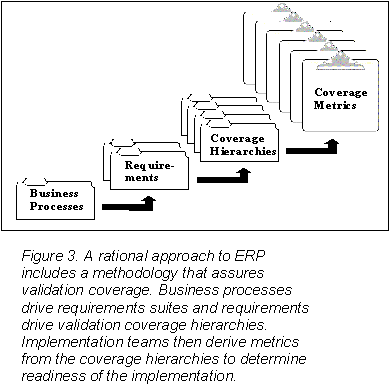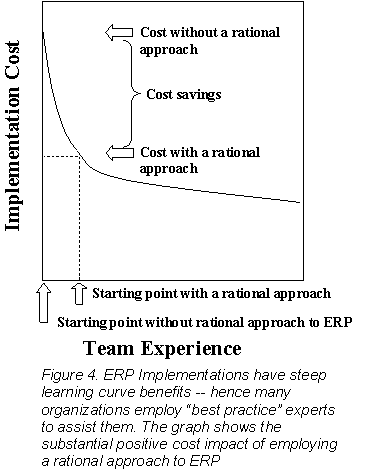 Most organizations start with a list of application functions they need to implement. Then they add any customizations needed for their specific organization. This list acts as a definitive guide throughout the implementation.
Most organizations start with a list of application functions they need to implement. Then they add any customizations needed for their specific organization. This list acts as a definitive guide throughout the implementation.
Rational Software Corporation
20 Maguire Road
Lexington, MA 02173
Phone: (781) 676-7666
Fax: (781) 676-7640
E-mail: bthornburg@rational.com
Table of Contents
Assuring Success In ERP Validations – Summary
Many organizations employ consultants specialized in ERP implementations to smooth their installation and transition, but how does an organization manage and validate these projects? What tools and techniques can an organization use to assure success, even when employing consultants? This paper discusses a new class of products that encompass processes, methodologies and software solutions that help ensure success in any ERP application – from new installations that change fundamental business processes to point release upgrades. We call the packaged collection of these processes, methods and software tools "a rational approach to ERP". The appendix of this paper includes a more detailed description of one of these product offerings.
Using these approaches provides peace-of-mind. This paper also shows how these products also have substantial, positive, bottom-line benefits.
Organizations spend months deciding how to upgrade their information systems. They sort through the many potential implementation partners and select one with the people and methodology to match their implementation. Now for the tough part – implementing and testing the results. Management and validation of ERP implementations can be difficult for the following reasons:
Implementation partners can help an organization make the right decisions in setting up a packaged ERP solution. They also help to determine where the ERP application does not supply the organization’s needs and help customize applications to meet them.
Packaged ERP vendors extensively test and validate the operation of their software. However, with tailoring options available in these applications, there are millions of different ways an organization can operate them. These drive the need for validation and management of any packaged ERP implementation – from a new installation to a routine software upgrade. Add to these the different ways that an organization can populate these applications with information. Now add the differences they can introduce when integrating with legacy applications, and you have the formula for a complex and time consuming implementation process – one that demands active management and results validation.
Traditional ERP implementation management often relies on crude measures of the true scope of the task and "best guesses" at the implementation progress. This leads to oft-cited horror stories of implementations that run over time and budget, and even those that are abandoned altogether. Even with cost and schedule overruns, few organizations choose to build these applications themselves. The advantages of using packaged applications are too compelling. These projects get delayed for a myriad of reasons, but delays are often the result of not understanding the complexity of the process, or not gaining a firm understanding of the scope of the validation effort.
The software industry has proven methodologies for management and validation of complex systems. These methodologies and products have now been extended to the management and validation of ERP implementations. These products form "a rational approach to ERP" and consist of a proven process methodology, an integrated suite of software products, and validation ‘assets’ that help assure success of any ERP implementation. These products help implementations finish sooner, at lower cost, and at higher quality.
A rational approach to ERP provides direction and automation at critical stages of an implementation, including:
Use a rational approach to ERP to plan, test, and track the implementation while progressing through the stages of data loading, customization, unit, system, and user acceptance testing. The approach helps direct each step of the process.
 Most organizations start with a list of application functions they need to implement. Then they add any customizations needed for their specific organization. This list acts as a definitive guide throughout the implementation.
Most organizations start with a list of application functions they need to implement. Then they add any customizations needed for their specific organization. This list acts as a definitive guide throughout the implementation.
This is the same basic process used for testing and tracking any implementation. The first step is making sure that the list of features and functions you will implement is also represented in the test plan. The planning process used in testing maps directly to your implementation. Test what you plan to implement, in the same order.
Packaged methodologies in a rational approach to ERP include pre-defined lists of what to test for each application. Organizations map these lists to their implementation plan. These pre-defined lists help speed an implementation because they indicate the proper level of detail to test, the proper order of data and test dependencies, and their importance in the application.
After planning, the next step is to use automated software tools and pre-recorded tests to verify that the implementation is behaving as required. By executing the tests on a regular basis, you verify that functions continue to work as planned and that the project is on target with the expected features.
The third step is reporting the progress of the implementation. Software products in a rational approach to ERP provide reports that show the progress of an implementation in terms of how complete and correct it is. These reports track progress against the list of features and functions. Use these reports to verify that anticipated features are working on specific dates.
The critical questions facing every decision-maker in an ERP implementation are how long it will take, what it will cost and how much risk there is in the project.
A cornerstone of the implementation team’s success lies in its ability to correctly assess the scope of the effort, identify appropriate resources and build in milestones for progress measurement. These are classic project management skills, and an experienced team leader brings these capabilities to the project.
 However, the team leader is not always able to determine the interaction of system components, judge the complexity of the overall system, or accurately schedule the interrelated implementation tasks. A rational approach to ERP assists in specifically identifying system requirements and providing a measurement methodology for determining their degree of completion. It includes a method for validating the system -- metrics for specifically identifying what parts of the system work, what parts don’t, and what parts are unknown. When moving from one milestone to the next during an implementation, it assures completion of each milestone, and assures changes have not introduced errors in previously completed functions.
However, the team leader is not always able to determine the interaction of system components, judge the complexity of the overall system, or accurately schedule the interrelated implementation tasks. A rational approach to ERP assists in specifically identifying system requirements and providing a measurement methodology for determining their degree of completion. It includes a method for validating the system -- metrics for specifically identifying what parts of the system work, what parts don’t, and what parts are unknown. When moving from one milestone to the next during an implementation, it assures completion of each milestone, and assures changes have not introduced errors in previously completed functions.
These metrics provide schedule visibility. You can assign and adjust as necessary the go-live date on their basis. Enterprises invest significant time, money and effort in the process of switching over to new and replacement systems. Missed go-live dates can have real bottom-line effects and increase the overall risk an organization assumes when implementing an ERP solution. These metrics provide important early-warning signals that a project is not on track so you can take corrective action before the effects are significant. A rational approach to ERP provides independent verification that features and functions are implemented and working with all other features.
Organizations often justify their investment in packaged ERP applications by predicting bottom-line benefits. Few organizations would undertake the disruption and complexity of a new ERP installation without believing real benefits would follow, so there is pressure to complete the implementation as soon as possible. A rational approach to ERP helps finish implementations sooner by automating set-up and by packaging ‘best practices’ experience.
A rational approach to ERP includes automated set-up processes that can accelerate implementation by reducing the time it takes to prepare the system for validation testing. Most implementations require frequent tests to assure validation, and these tests usually require specific starting points to verify results. It includes set-up processes that initialize the system for further tests. It might take many weeks to properly set up all the test data required to fully test a system manually. Since it comes with this test data pre-defined, organizations can use them to quickly set up the test environment.
In addition, many organizations use these set-up processes to automatically load their organization-specific information. Rather than require users to manually enter all the initial data values, they use these set-up processes to automatically load organization data.
An additional approach to compressing time is to hire consulting organizations with expertise specific to the area of endeavor. For example, organizations hire ERP implementation experts, and leverage their expertise in order to complete the implementation sooner.
 Packaged methodologies offer a valuable and innovative benefit by packaging the best practices experience of these implementation experts. While no two ERP implementations are the same, all are based on the same underlying processes and software, and all start from the same base capabilities. A rational approach to ERP includes methods, plans, procedures and test cases that validate the base functionality. Implementation teams use these as starting points for creating their own validation cases. Where the team has performed little modification of the application, these processes apply directly and the team leverages the experience of previous implementations. Where they include extensive customization, the team modifies these processes and cases to accommodate the changes. The validation plan, which defines the exact order of validation required for implementations, in combination with these processes and test cases, helps jump-start an implementation and finish it sooner.
Packaged methodologies offer a valuable and innovative benefit by packaging the best practices experience of these implementation experts. While no two ERP implementations are the same, all are based on the same underlying processes and software, and all start from the same base capabilities. A rational approach to ERP includes methods, plans, procedures and test cases that validate the base functionality. Implementation teams use these as starting points for creating their own validation cases. Where the team has performed little modification of the application, these processes apply directly and the team leverages the experience of previous implementations. Where they include extensive customization, the team modifies these processes and cases to accommodate the changes. The validation plan, which defines the exact order of validation required for implementations, in combination with these processes and test cases, helps jump-start an implementation and finish it sooner.
Besides the peace-of-mind that a rational approach to ERP brings to an organization, it also provides bottom-line benefits. The sample below shows how one organization calculated the benefits.
A major international hotel chain undertook a new ERP installation of human resources and financials applications – seven modules in all. This organization employed consultants to assist in the implementation. The implementation team estimated that each module required 4.25 person months to verify. The team concluded they could save 70% of this effort by using the automated verification methodology available in a rational approach to ERP. This calculation resulted in savings estimates of just over 20 person months in a six-month implementation program. They also derived additional savings from forecasts for reduced costs for verifying software and network upgrades, assumed to occur twice per year. Finally, the team reduced risks in the project through the use of the approach.
Since this system runs on already-installed hardware and network infrastructure, new capital equipment costs were not included in the return on investment (ROI) analysis. The program costs included the purchase of software and people costs associated with running it in place of the manual validation efforts. The people costs were estimated at 10 person months total.
|
ROI Analysis |
|||||
|
ROI |
149% |
||||
|
Payback Period (in years) |
0.51 |
||||
|
Cash Flow |
Base Year |
Year 2 |
Year 2 |
Year 4 |
|
|
Production savings |
586,551 |
140,182 |
140,182 |
140,182 |
|
|
Operating Expenses |
(259,743) |
(32,216) |
(32,216) |
(32,216) |
|
|
Interest Income (expense) |
8,279 |
3,136 |
3,136 |
3,136 |
|
Net Savings Before Income Taxes |
335,087 |
111,102 |
111,102 |
111,102 |
|
|
Income Taxes |
167,544 |
55,551 |
55,551 |
55,551 |
|
|
Net Income |
167,544 |
55,551 |
55,551 |
55,551 |
|
|
Add Back Depreciation |
4,365 |
17,460 |
17,460 |
17,460 |
|
|
Cash From Operations |
171,909 |
73,011 |
73,011 |
73,011 |
|
|
Capital Expenditures |
87,300 |
||||
|
Net Cash Flow |
84,609 |
73,011 |
73,011 |
73,011 |
|
|
Cumulative Cash Flow |
84,609 |
157,619 |
230,630 |
303,641 |
|
Assuring Success In ERP Validations – Summary
Success in ERP implementations is neither happenstance nor the result of luck. It results from detailed planning, best practices methodologies, systematic reporting, and the judicious use of integrated validation software and pre-defined test assets. We refer collectively to these processes, methods, procedures and products as a "rational approach to ERP." Using a rational approach to ERP can reduce implementation time, improve the quality of an ERP implementation, and save money.
Using these products provides important progress metrics – direct and independent measures of the overall progress of the project – which indicate early where the risks lie, what parts of the project are on track, and overall status of completion.
Besides peace of mind, organizations that use a rational approach to ERP can realize bottom-line benefits. Implementation teams that employ these products can calculate significant return for their investment in products and people.
Rational Software’s approach to ERP is called Rational TestFoundation, the first complete validation suite for ERP implementations. This suite includes:
Rational Objectory Process is the industry’s only formalized methodology for automated validation of client/server applications. Rational Objectory Process provides a methodology, detailed structure, templates and tools for all phases of an implementation effort. It ensures coverage and efficiency in developing and maintaining automated test suites. In close cooperation with major ERP vendors and implementation experts, Rational modified Rational Objectory Process for specific application in ERP implementations.
SQA Robot is a software tool that provides object-level integration with major ERP systems for recording and playback of validation tests. Object-level integration means the record/playback technology has a better understanding of the ERP application and so creates robust validation scripts which maximize defect detection while minimizing "false positive" defect reports.
SQA Manager
SQA Manager gives detailed graphical views of the coverage of validation efforts and their state of completion. In addition, SQA Manager tracks all defects and open issues and provides the primary completeness metrics. This is the software that answers the questions: where are we and when will we finish?
Rational TestFoundation
products include pre-defined cores of test requirement hierarchies designed directly from ERP validation methodologies. These form the architectural structure for validation efforts. They define coverage and completeness of the overall validation effort. Since many implementation modifications are changes to specific coverage or changes of base ERP functionality, these hierarchies form the structure in which an implementation team maps validation strategies for modifications. These assets ensure a high degree of confidence in validation coverage of the finished system.Rational TestFoundation
These are the processes, procedures, and test cases an implementation team uses to ensure the system is initially installed and operating correctly. They are the foundation on which the team builds to validate new functionality as they customize ERP applications. These assets help the team finish the job faster.
The validation methodology describes how to verify implementations. The test design describes specifically how to verify that the implementation meets specific requirements. Rational TestFoundation includes test design documents for all the scripts in the test repository, as well as detailed information on how to build tests for additions, modifications, integration with other applications, and batch processes.
Rational TestFoundation
SQA Suite is Rational’s premier automated testing toolset. It has received more industry awards than any other automated software quality solution. It has won the PC Week Labs’ Corporate IT Excellence (ITX) Award, PC Week Labs’ Analyst Choice Award, the PowerBuilder Developer’s Journal Product Excellence Award twice, the 1994, 1995, and 1996 DBMS Readers’ Choice Award, and three Software Development Productivity Awards. SQA Suite includes technical integrations with SAP, PeopleSoft, and Oracle Applications.
About Rational Software Corporation
Rational Software Corporation (NASDAQ: RATL) develops, markets, and supports a comprehensive solution that automates the component-based development of software. Rational's solution includes an integrated family of products that automate development and quality assurance throughout the software lifecycle, a software process that can be configured to the specific needs of customers, and a range of consulting and support services. For more information on Rational's products and services, visit Rational's Web site at www.rational.com.